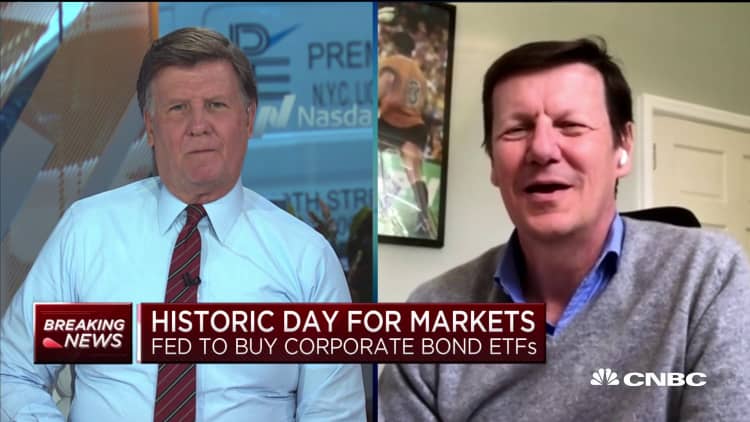
Stocks fell sharply on Tuesday, giving back some of their recently strong gains, as investors evaluated the latest attempts to reopen the economy.
The Dow Jones Industrial Average closed 457.21 points lower, or 1.9%, at 23,764.78. The S&P 500 dropped 2.1% to 2,870.12 while the Nasdaq Composite also fell more than 2% to 9,002.55. Tuesday's decline snapped a six-session winning streak for the Nasdaq.
Stocks poised to benefit from economies reopening rolled over in afternoon trading, dragging down the major averages. Bank of America, Citigroup, JPMorgan Chase and Wells Fargo all fell at least 3%. Nike and Disney both closed 2.9% lower.
Investors also cooled off from buying technology stocks. Facebook, Amazon and Apple all slid more than 1%. Netflix and Alphabet both closed 2% lower.
"The economic worries are still front and center here. Even though there are reopenings, they're going to go slowly," said Peter Boockvar, chief investment officer at Bleakley Advisory Group. "There's this underlying worry the economy is going to rebound in a slow fashion and we're still in a deep recession. This was covered up by hopes of reopening and performance of big cap tech."
Dr. Anthony Fauci, director of the National Institute of Allergy and Infectious Diseases, and other health officials testified before the Senate Health Committee to discuss reopening the economy. Fauci noted a vaccine will be essential in stopping the coronavirus spread, but warned it will be a while before a usable one is available. Fauci added the U.S. could face more "suffering and death" if states start to reopen too quickly.
"Markets have been torn between optimism on the tentative re-opening of some economies and caution on the still grim economic data," Mike Pyle, global chief investment strategist at BlackRock Investment Institute, said in a note. "Markets will watch out for any cracks in the financial system and elsewhere in the economy as virus infections climb."
Several states, including Georgia, Texas and Tennessee have already started to let nonessential businesses resume operations. New York officials have also laid out a plan to gradually reopen the state.
"We're just starting to get some ideas about what some of these economies are looking like as they reopen," said Megan Horneman, portfolio strategist at Verdence Capital Advisors. "Until we get some more solid data out of that, which is a few weeks away, people are just going to be in limbo for a bit."
More than 4 million cases have been confirmed globally, according to Johns Hopkins University. In the U.S. alone, over 1.3 million infections have been confirmed.
Senator Lindsey Graham introduced legislation to require China to cooperate with a coronavirus investigation or face sanctions, pressuring market sentiment.
Tuesday's moves came as the Federal Reserve started buying corporate bonds and some of the ETFs that track them. The Fed announced these programs last month as they try to cushion the economic blow from the coronavirus pandemic. The iShares IBoxx Investment Grade Corporate Bond ETF (LQD) climbed 1%.
"The Fed's actions so far also point to a willingness to do more if required," said Oliver Jones, senior market economist at Capital Economics. "The size of the programs could presumably be increased too if market conditions deteriorated, albeit with the Treasury providing more equity."
Despite Tuesday's losses, the Nasdaq remained up about 0.3% for the year as Wall Street has recently loaded up on shares of major tech companies. Shares of Amazon and Netflix both soared more than 30% this year, while Microsoft gained 18%. Chipmaker Nvidia hit a fresh all-time high on Tuesday, bringing its 2020 gains to 38%.
"Growth has been bulletproof in 2020," Stephen Suttmeier, Bank of America's technical research strategist, said in a note on Monday. "No change in leadership as the 2020 parabolic rise for Growth vs Value achieves the Y2K Tech Bubble peaks."
While bouncing swiftly from their March lows, the S&P 500 and the Dow are still well in the negative territory for the year, down 9.3% and 15.1%, respectively. Energy remains the worst-performing sector among the 11 S&P 500 groupings, with a 37% loss in 2020.
Subscribe to CNBC PRO for exclusive insights and analysis, and live business day programming from around the world.



